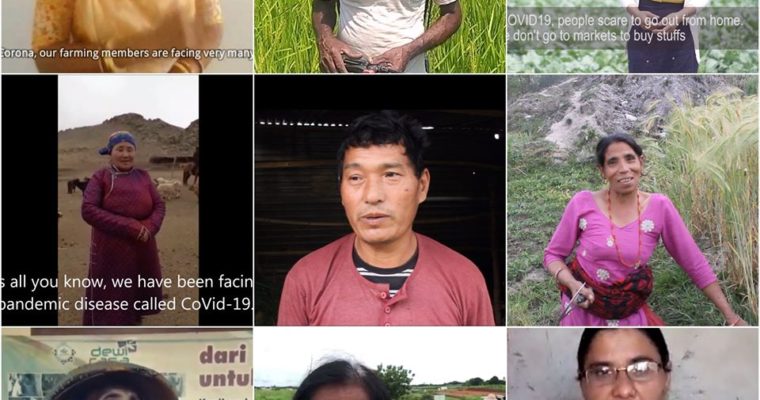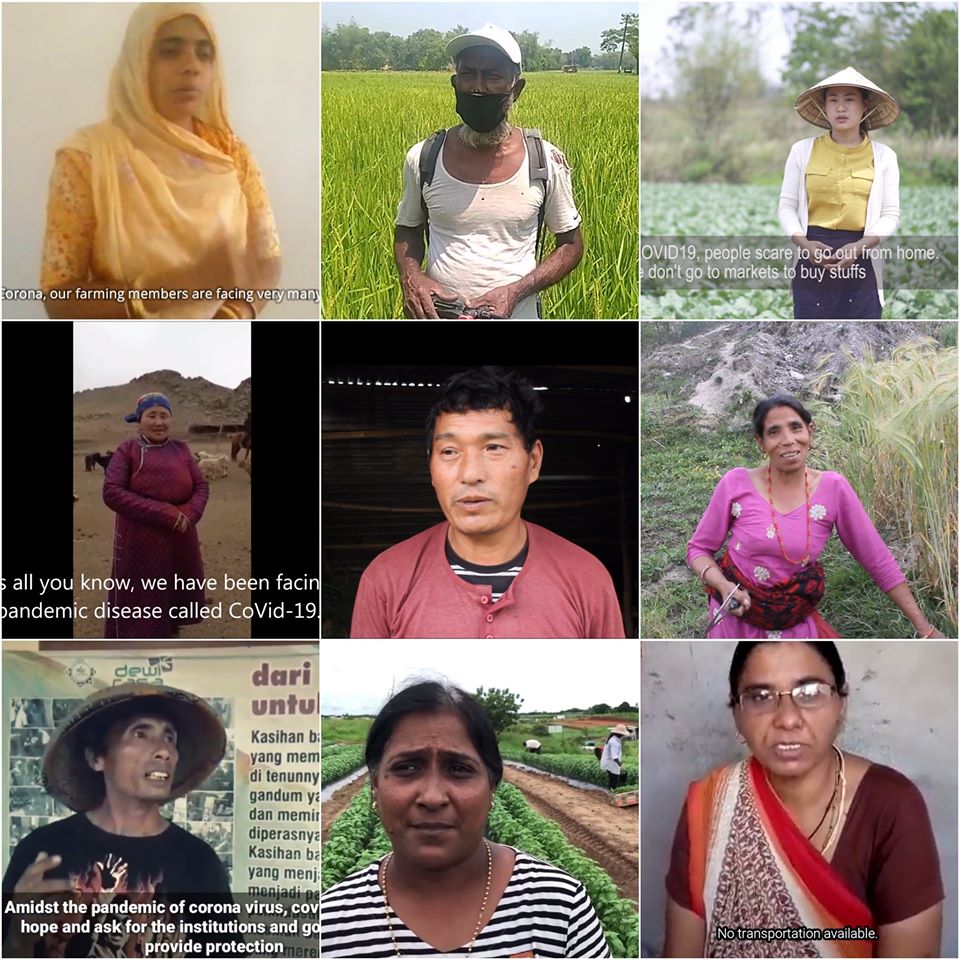Farmers and fishers are the hardest hit during this global crisis brought by the COVID-19 pandemic. Many countries decided to close their borders for the time being to contain the spread of the virus, and consequently, this affected the livelihood of farmers and fishers. Lockdowns and quarantines resulted in a lack of buyers, lack of transportation for bringing the produce to the market, as well as total closure of marketplaces. Meanwhile, in places where they are allowed to work on their farms, farmers and fishers face the threat of being infected with the virus as they continue to work in open spaces.
In these videos, farmers from countries in Asia and the Pacific narrate the challenges they face in this time of crisis.
Bangladesh
Farmers in Bangladesh are facing serious problems during this time of crisis. Citizens are asked by the government to stay at home to avoid being infected by the COVID-19 pandemic. Because of this, farmers find it difficult to go to their farms to check on their crops. Shops including those that sell fertilizer have also closed down temporarily. Farming is the sole livelihood of many farmers in the country. If they cannot farm, they face an even bigger threat that is hunger.
Fiji
In Fiji, establishments such as hotels and restaurants have closed to adhere to the government’s measures to avoid the spread of the COVID-19 pandemic. In effect, farmers in the country can no longer sell their produce anywhere. Thus, they appeal to the Fijian government for support so they can sell or export their produce during this time to help the farm laborers who depend on farming for their income.
India
Bhavnaben Suthar of Dungarpur, India is a farmer and master trainer for SEWA Manager Ni School. She grows various crops including wheat, chana, and sarso in her farmland. The majority of farmers in their area also grows vegetables. However, their livelihood is deeply affected by the COVID-19 pandemic. As her farm is far from the market, Bhavnaben now couldn’t find any means to transport her produce to the market. Some marketplaces have also closed down. Their crops will just go to waste if not sold soon.
It is now harvest season in Sagwara district in India. However, the country was placed under lockdown to contain the spread of COVID-19. In effect, harvesting machines and laborers are not allowed to go outside or to travel to other villages. Without help from laborers, farmers will not be able to harvest their crops. Without harvest, farmers have no other source of income to support themselves.
In Gamda Bamaniya village in India, many farmers cultivate wheat. However, right now they face challenges in terms of their livelihood. It is the harvest season now, but due to the lockdown being implemented in the country to stop the spread of COVID-19, laborers from other villages cannot travel to help with the harvesting of wheat. Earlier, unseasonal rains also ruined many of their crops. In addition to these, the men in the family are currently stuck in Mumbai where they work, so there are no other people to help the women in the household in bringing their crops home. Since laborers are not available, they cannot seek help elsewhere.
Ritikaben of SEWA appeals to the government to provide support to these farmers, especially the women farmers who badly need help.
Indonesia
Now more than ever, we need a strong immune system. Farmers in Indonesia strongly promote the consumption of healthy rice cultivated without using artificial chemical inputs.
Moreover, they are also appealing to the Indonesian government to provide protection for farmers as they continue to work on their farms to provide food for the world in this time of crisis.
Laos
Because of the COVID-19 pandemic, currently, vegetable farmers in Laos are not able to sell their produce. While markets remail open, many vendors chose to close their shops and many people are also afraid to go out.
Laos farmers appeal to their Laos government to help them by purchasing their vegetables and distribute these for free to the people affected by COVID-19. The government can also extend assistance by helping the farmers build cooling facilities where they can store their vegetables so they don’t go to waste.
Bounthan Sayalath, member of the Houan Oun organic vegetable group in Xay district, Oudomxay province, Laos says that they used to sell 800 to 1,000 kilograms of vegetables per day, but nowadays, they face a serious problem because no one is buying bulk produce. Last month, their group had a meeting and decided to suspend their production until April 16. Their members depend on selling vegetables and because of the COVID-19 pandemic, their sole source of income is affected. The group appeals to the Laos government to provide them assistance with the production inputs for the next cropping season also to ensure the market so they can still sell their produce.
Aien is a fruit and vegetable trader from Laos. She used to sell baskets of bananas, potatoes, and taros at Kuadin fresh market. When the COVID-19 pandemic hit the country, she had to shut down her shop. The market remains open, but she does not have any goods to sell.
In the farms where Aien procures goods, the bananas are now ready for harvesting. But farmers are not able to sell their produce because many roads have been closed and trucks, even those carrying food produce, are not allowed to go through.
The Nongsung vegetable group in Paksong district, Champasack province, Laos sells 20 tons of cabbage daily, exporting to Thailand. This was before the COVID-19 pandemic. Now, these farmers don’t know what to do with their produce as no one is buying and they cannot sell to the local markets either. Tonnes of cabbages are on the verge of being wasted.
To avoid this from happening, the farmers are requesting assistance in looking for buyers. At this point, they just want to gain back their production cost. Secondly, they request for the government to provide them with a revolving production fund so they can recover from this crisis that hit farmers all over the world.
Khambe Oouanouansa is an online organic vegetable trader based in Vientiane capital, Laos. She acquires vegetables from Hoaphan, Xiengkhouang, and Vientiane province. Right now, Khambe faces a major problem. She already accepted orders from customers, but the produce from Hoaphan cannot be delivered because transport from Hopahan to Xiengkhouang and from Xiengkhouang to Vientiane capital is currently not allowed.
Khambe appeals to concerned government organizations in the country to help facilitate trading so they can resume their business and also to avoid wastage of vegetables from their suppliers.
In Laos, tons of vegetable produce is going to waste. Many shops at fresh markets have closed after the government enforced a lockdown. Roads are also close, limiting movement and transportation. And if there is any transportation available, it costs double.
Lao farmers are appealing to the government to assist them in this time of crisis. Among their recommendations is to provide them with cooling facilities where they can store their vegetables for the time being, so they can sell them later.
Farmers from Thongmung Organic Vegetable group, in Vientiane capital, Laos, are also heavily affected by the COVID-19 pandemic. No one is buying their crops; it is difficult to travel from place to place; many agri shops in the markets are closed so there is nowhere to buy seeds and fertilizers, and the people themselves are afraid to go out for fear that they might get the virus.
However, a positive thing emerged from this situation. The government stopped importing vegetables so this will provide an opportunity for local farmers to fulfill the demands of the domestic market. All they are asking is support from the government.
Mongolia
Mongolia closed its borders as a measure to contain the spread of COVID-19 in the country. This move resulted in many factories reducing their production. In effect, herders are not able to sell raw materials including wool, cashmere, as well as meat products to the factories. Herders rely on selling wool for their livelihood, but right now, the price has dropped as no one is buying. They are asking for their government to help them by controlling the market price so they can overcome the challenges brought about by the pandemic.
Nepal
The lockdown in Nepal created problems for farmers all over the country. Right now, farmers cannot sell their vegetables, dairy, and livestock to the market due to lack of transportation. Despite the lockdown, livestock growers still need to collect fodder for their cattle, otherwise, they will die. In addition to these challenges, the price of rice and other essentials also hiked up.





Comments are closed